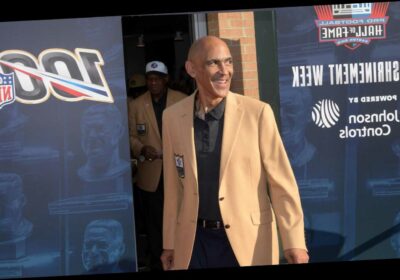Opinion: Hall of Famer Tony Dungy destroys the myth of the poorly interviewing Black coach

Former Buccaneers and Colts head coach Tony Dungy heard for years he didn't interview well for head coaching positions. Now he's in the Hall of Fame. (Photo: Kirby Lee, USA TODAY Sports)
Tony Dungy, now in the Hall of Fame, remembers going through interviews for head coaching positions, and how afterward he'd hear that the interview went poorly.
"For years, that was said about me," Dungy explained to USA TODAY Sports. "What's behind it is a caricature of what a head coach should be. In my case, I was calm. I didn't curse at people. Some owners believed that unless you jumped up and down on a table, you're not a real coach."
Dungy remembers interviewing with one owner and the owner told him: "I like a lot of things about you, but you're so soft spoken, you don't curse. How are you going to control a locker room?"
"I'd do what I've done my entire career," Dungy says he told the owner, "which is earn the trust and respect of the players by appealing to their intellect, their professionalism."
"I just don't think this can work," said the owner.
"That," Dungy says now, "was a 'poor interview.' "
Dungy would go on to win a Super Bowl with the Indianapolis Colts and become one of the greatest defensive minds in the history of the game. But he didn't get that job because he didn't demonstrate in an interview that he could curse a lot if he needed to.
Why is this relevant? Because the poorly interviewing Black coach narrative is happening again, this time with Kansas City offensive coordinator Eric Bieniemy. Like a hockey-masked villain in a horror movie, it's baaaaaaack.
There's no need to repeat the origin of the Bieniemy rumor but it became a thing (again) recently. Last year, there were people in the NFL quietly spreading the same rumor about Bieniemy. I was specifically told by several team executives that this narrative was circulating. The rumor is, by all accounts, false.
The interview has long been a land mine for Black coaches, some of them have told me for years. They can occasionally be of great benefit as Mike Tomlin's interview with owner Dan Rooney helped him get the job.
The interview can also be used as a weapon. Black coaches say privately that if an owner or general manager never wanted to hire a Black coach in the first place, they will say the coach interviewed poorly.
It's not that white candidates aren't accused of having poor interviews, it's that Black ones face this narrative so much, it's become almost a running joke with Black coaches.
"What bothers me," said Dungy, "is you rarely hear about young white candidates having bad interviews. Whenever I hear about poor interviews, it's almost always about Black candidates. My antenna goes up when I hear about Black candidates not interviewing well. It reminds me of my own experience in the past."
Or, the interview will be used by an owner to say he felt more comfortable with another candidate.
“I’ve been in interviews and asked later, ‘Why did you hire him instead of me?’ " said former Washington assistant Ray Horton to The Washington Post last year. "And they’ve said they felt more comfortable with the guy. How do you quantify that? Why did they feel more comfortable with him?”
“Mike Tomlin wasn’t supposed to get the Pittsburgh job, but he got it in the interview,” one offensive coach told the Post. “So there’s hope you can go in and win the room. At the same time, there comes a point when they start to think you’re a dumb n—– just for going. I’ve felt that, being there as a token, where you know you have no shot.”
Bieniemy thus far has interviewed with the Lions, Falcons, Jaguars, Chargers and Jets. Bieniemy could be a strong candidate in Philadelphia as the Eagles just fired coach Doug Pederson. He's also a candidate in Houston.
The odds remain high Bieniemy will get a head coaching job. But the fact coaches still have to deal with this myth remains disturbing.
"We need to move past this kind of stuff," Dungy said.
Dungy was asked if he ever saw that owner who said he didn't think he'd be a good coach.
"Years later I saw him," Dungy said, "He told me, 'I was wrong about you.' "
Source: Read Full Article
